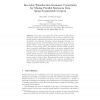Free Online Productivity Tools
i2Speak
i2Symbol
i2OCR
iTex2Img
iWeb2Print
iWeb2Shot
i2Type
iPdf2Split
iPdf2Merge
i2Bopomofo
i2Arabic
i2Style
i2Image
i2PDF
iLatex2Rtf
Sci2ools
IJCNLP
2005
Springer
2005
Springer
Inversion Transduction Grammar Constraints for Mining Parallel Sentences from Quasi-Comparable Corpora
Abstract. We present a new implication of Wu’s (1997) Inversion Transduction Grammar (ITG) Hypothesis, on the problem of retrieving truly parallel sentence translations from large collections of highly non-parallel documents. Our approach leverages a strong language universal constraint posited by the ITG Hypothesis, that can serve as a strong inductive bias for various language learning problems, resulting in both efficiency and accuracy gains. The task we attack is highly practical since non-parallel multilingual data exists in far greater quantities than parallel corpora, but parallel sentences are a much more useful resource. Our aim here is to mine truly parallel sentences, as opposed to comparable sentence pairs or loose translations as in most previous work. The method we introduce exploits Bracketing ITGs to produce the first known results for this problem. Experiments show that it obtains large accuracy gains on this task compared to the expected performance of state-of-the...
Comparable Sentence Pairs | IJCNLP 2005 | Natural Language Processing | Parallel Sentence Translations | Parallel Sentences |
| Added | 27 Jun 2010 |
| Updated | 27 Jun 2010 |
| Type | Conference |
| Year | 2005 |
| Where | IJCNLP |
| Authors | Dekai Wu, Pascale Fung |
Comments (0)

